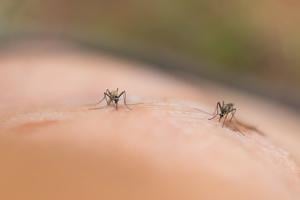Researchers in the Netherlands have transformed a major music festival into an unexpected laboratory to investigate why certain individuals attract more mosquitoes than others. During the Lowlands festival in Biddinghuizen, the team from Radboud University Medical Center conducted their study over three days, setting up pop-up laboratories within shipping containers.
Festivalgoers eagerly lined up to participate in the “Mosquito Magnet Trial,” which aimed to measure personal attractiveness to mosquitoes. From 9 a.m. to 10 p.m. daily, participants rested their arms against transparent acrylic boxes containing caged mosquitoes. The insects responded to human scents while a camera and computer system recorded their movements, ultimately calculating individual attraction scores.
The study engaged over 500 volunteers and revealed a wide spectrum of results. Some individuals attracted mosquitoes to a sugar feeder, while others became instant magnets. Preliminary findings, published on bioRxiv.org, highlighted surprising correlations between certain behaviors and increased mosquito attraction.
One key finding indicated that festival attendees who consumed beer were 44% more attractive to mosquitoes than those who abstained. Similarly, recent cannabis users also drew the insects significantly more than others. Participants who shared sleeping quarters the previous night registered higher attraction scores, suggesting that proximity may play a role in mosquito preference.
Interestingly, the researchers discovered a simple method to reduce attractiveness to these insects. Individuals who had applied sunscreen were about half as appealing to mosquitoes compared to those who had not used any. This suggests that sunscreen may offer a potential deterrent effect against bites.
Felix Hol, the quantitative biologist who led the study, expressed his delight at the enthusiastic participation. “You’d hear loud cheers when a score popped up on the scoreboard,” he remarked in a news release, reflecting on the vibrant atmosphere at the festival. “I was really completely overwhelmed by the enthusiasm for the project and for science in general.”
Despite the engaging nature of the study, Hol cautioned that the findings should be interpreted with care due to the unconventional setting and the specific demographic of volunteers. The festival environment introduced numerous variables, and the majority of attendees were young, camping enthusiasts, which may not represent the general population.
The team noted that while their findings are preliminary, they provide a fascinating glimpse into mosquito behavior and the factors that influence human susceptibility to bites. Hol humorously suggested, “If you don’t want to attract mosquitoes, don’t drink beer, don’t smoke weed, don’t sleep with people, and put on your sunscreen.” As an alternative, he added, “You can do whatever you want and put on long sleeves.”
For further information on preventing mosquito bites, the U.S. Centers for Disease Control and Prevention offers additional resources. While this study’s findings are still in the early stages, they indicate that applying sunscreen could serve as an unexpected layer of protection against these pesky insects.







































































